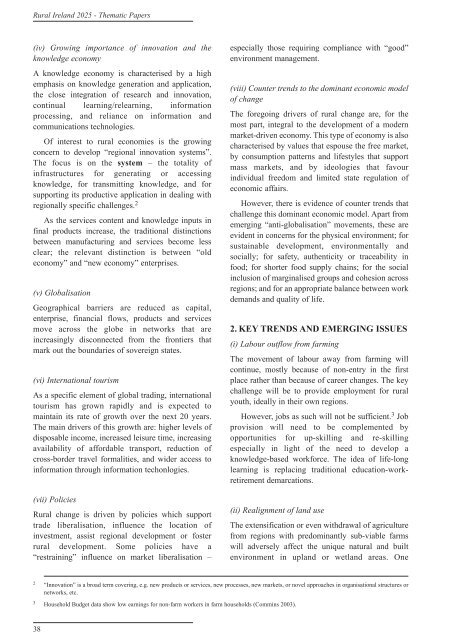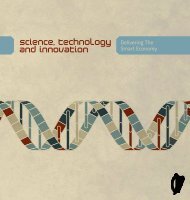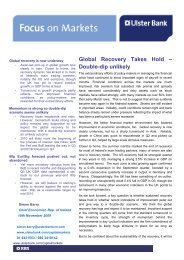RURAL IRELAND 2025 Foresight Perspectives - Coford
RURAL IRELAND 2025 Foresight Perspectives - Coford
RURAL IRELAND 2025 Foresight Perspectives - Coford
- No tags were found...
Create successful ePaper yourself
Turn your PDF publications into a flip-book with our unique Google optimized e-Paper software.
Rural Ireland <strong>2025</strong> - Thematic Papers(iv) Growing importance of innovation and theknowledge economyA knowledge economy is characterised by a highemphasis on knowledge generation and application,the close integration of research and innovation,continual learning/relearning, informationprocessing, and reliance on information andcommunications technologies.Of interest to rural economies is the growingconcern to develop “regional innovation systems”.The focus is on the system – the totality ofinfrastructures for generating or accessingknowledge, for transmitting knowledge, and forsupporting its productive application in dealing withregionally specific challenges. 2As the services content and knowledge inputs infinal products increase, the traditional distinctionsbetween manufacturing and services become lessclear; the relevant distinction is between “oldeconomy” and “new economy” enterprises.(v) GlobalisationGeographical barriers are reduced as capital,enterprise, financial flows, products and servicesmove across the globe in networks that areincreasingly disconnected from the frontiers thatmark out the boundaries of sovereign states.(vi) International tourismAs a specific element of global trading, internationaltourism has grown rapidly and is expected tomaintain its rate of growth over the next 20 years.The main drivers of this growth are: higher levels ofdisposable income, increased leisure time, increasingavailability of affordable transport, reduction ofcross-border travel formalities, and wider access toinformation through information techonlogies.(vii) PoliciesRural change is driven by policies which supporttrade liberalisation, influence the location ofinvestment, assist regional development or fosterrural development. Some policies have a“restraining” influence on market liberalisation –especially those requiring compliance with “good”environment management.(viii) Counter trends to the dominant economic modelof changeThe foregoing drivers of rural change are, for themost part, integral to the development of a modernmarket-driven economy. This type of economy is alsocharacterised by values that espouse the free market,by consumption patterns and lifestyles that supportmass markets, and by ideologies that favourindividual freedom and limited state regulation ofeconomic affairs.However, there is evidence of counter trends thatchallenge this dominant economic model. Apart fromemerging “anti-globalisation” movements, these areevident in concerns for the physical environment; forsustainable development, environmentally andsocially; for safety, authenticity or traceability infood; for shorter food supply chains; for the socialinclusion of marginalised groups and cohesion acrossregions; and for an appropriate balance between workdemands and quality of life.2. KEY TRENDS AND EMERGING ISSUES(i) Labour outflow from farmingThe movement of labour away from farming willcontinue, mostly because of non-entry in the firstplace rather than because of career changes. The keychallenge will be to provide employment for ruralyouth, ideally in their own regions.However, jobs as such will not be sufficient. 3 Jobprovision will need to be complemented byopportunities for up-skilling and re-skillingespecially in light of the need to develop aknowledge-based workforce. The idea of life-longlearning is replacing traditional education-workretirementdemarcations.(ii) Realignment of land useThe extensification or even withdrawal of agriculturefrom regions with predominantly sub-viable farmswill adversely affect the unique natural and builtenvironment in upland or wetland areas. One2 “Innovation” is a broad term covering, e.g. new products or services, new processes, new markets, or novel approaches in organisational structures ornetworks, etc.3 Household Budget data show low earnings for non-farm workers in farm households (Commins 2003).38








